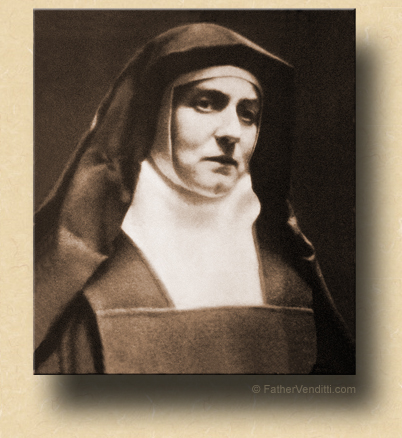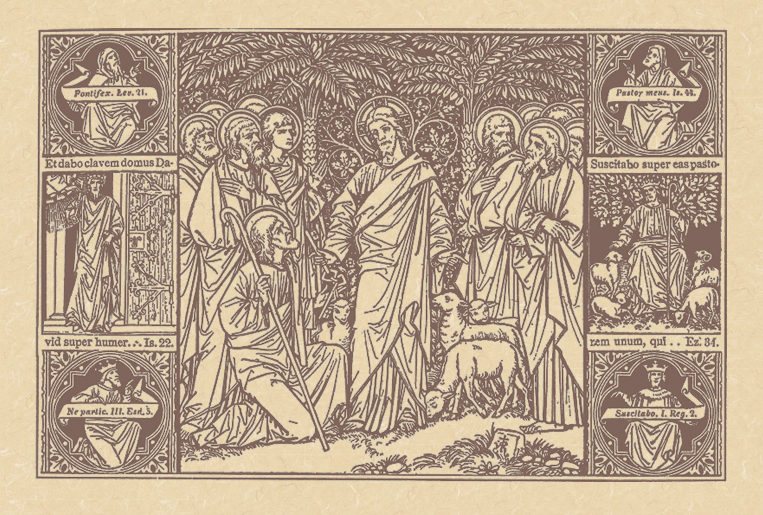We Don't Define Christ; He Defines Us.
The Eighteenth Thursday of Ordinary Time; or, the Memorial of Saint Teresa Benedicta of the Cross.
Lessons from the secondary feria, according to the ordinary form of the Roman Rite:
• Jeremiah 31: 31-34.
• Psalm 51: 12-15, 18-19.
• Matthew 16: 13-23.
|
…or, any lessons from the common of Martyrs for a Virgin Martyr, or the common of Virgins for One Virgin.
|
The Third Class Vigil of Saint Lawrence, Martyr; and, the Commemoration of Saint Romanus, Martyr.*
Lessons from the proper, according to the extraordinary form of the Roman Rite:
• Ecclesiasticus 51: 1-8, 12.
• Psalm 111: 9, 12.
• Matthew 16: 24-27.
FatherVenditti.com
|
 9:11 PM 8/9/2018 — Today is not only the memorial of Saint Teresa Benedicta of the Cross, it is also the 76th anniversary of the martyrdom of this brilliant philosopher and professor of philosophy known more popularly by her birth name, Edith Stein. She was born in 1891 to Jewish parents in Breslau, Germany, which is now part of Poland. She studied philosophy under Husserl, who was the father—more or less—of a philosophical school of thought known as phenomenology. Husserl also had a profound influence on a young Karol Wojtyła, who, like Saint Teresa Benedicta, was also a professor of philosophy. Inspired by the writings of Saint Teresa of Avila, she was baptized on January 1st, 1922, and went on to teach philosophy at several Catholic universities in Germany from 1923 through 1933 until forced to resign due to antisemitic legislation. The very year she resigned her professorship, she entered the Discalced Carmelite convent in Cologne, where she received her religious name of Teresa Benedicta of the Cross. Toward the end of 1939, she was transferred to the convent at Echt, Holland, on account of the Nazi persecution of the Jews; but, in 1942, when Germany occupied the Netherlands, she was arrested and sent to Auschwitz, which is where she met her death. 9:11 PM 8/9/2018 — Today is not only the memorial of Saint Teresa Benedicta of the Cross, it is also the 76th anniversary of the martyrdom of this brilliant philosopher and professor of philosophy known more popularly by her birth name, Edith Stein. She was born in 1891 to Jewish parents in Breslau, Germany, which is now part of Poland. She studied philosophy under Husserl, who was the father—more or less—of a philosophical school of thought known as phenomenology. Husserl also had a profound influence on a young Karol Wojtyła, who, like Saint Teresa Benedicta, was also a professor of philosophy. Inspired by the writings of Saint Teresa of Avila, she was baptized on January 1st, 1922, and went on to teach philosophy at several Catholic universities in Germany from 1923 through 1933 until forced to resign due to antisemitic legislation. The very year she resigned her professorship, she entered the Discalced Carmelite convent in Cologne, where she received her religious name of Teresa Benedicta of the Cross. Toward the end of 1939, she was transferred to the convent at Echt, Holland, on account of the Nazi persecution of the Jews; but, in 1942, when Germany occupied the Netherlands, she was arrested and sent to Auschwitz, which is where she met her death.
My undergraduate degree is in philosophy, so I'm familiar with some of her writings, and they are thick going, the kind of books you have to read with a bottle of Excedrin next you just to keep your head from exploding.
Sister Teresa Benedicta of the Cross was canonized and declared a martyr—no surprise—by fellow author of philosophy textbooks, Pope Saint John Paul II, who also declared her co-patroness of Europe, along with Saint Bridget of Sweden and Saint Catherine of Siena.
Yesterday’s Gospel lesson was about the importance of docility before the will of God, whose ways are not our ways, which is the only way to understand our Blessed Lord's curious treatment of the woman featured in yesterday’s Gospel lesson, who had traveled a great distance to seek our Lord's help for her daughter, and whom the Lord seems to treat very badly at first, but for the purpose of giving an instruction to both her and to His disciples who witnessed the incident. It just so happens that today's Gospel lesson picks up where yesterday’s left off—not exactly but almost—and puts the whole theme of the last few week's into perfect context; for, today, our Blessed Lord explains why it's so important to be docile before the permissive will of God: because He's God!
But, like any good teacher, He doesn't just come out and say it; he plays Socrates, and teaches by asking questions, in this case the quintessential question with which every Christian is confronted at some point in his or her life: “Who do you say that I am?” (Matt. 16: 15). But it's interesting to note how He does this: He begins the process of teaching not by asking His disciples who they think He is, but who other people think He is. Two thousand years before psychology was invented, our Lord is a psychologist: He knows that, when you confront someone directly and ask them bluntly what they think, they're going to be defensive and throw up a wall and evade the question; so, He asks them not who they think He is, but “Who do people say that the Son of Man is?” (v. 13 NABRE).  By taking them out of the equation, they don't become defensive because He's not asking them about themselves. Not having anything to be defensive about, they feel free to say whatever is on their minds, so they give him a whole catalog of answers: “Some say John the Baptist, others Elijah, still others Jeremiah or one of the prophets” (v. 14 NABRE). But He's not done: now that He's got their defenses down and in a talkative mood, then He confronts them with the personal question: “Jesus said to them, And what of you? Who do you say that I am?” (v. 15 Knox). By taking them out of the equation, they don't become defensive because He's not asking them about themselves. Not having anything to be defensive about, they feel free to say whatever is on their minds, so they give him a whole catalog of answers: “Some say John the Baptist, others Elijah, still others Jeremiah or one of the prophets” (v. 14 NABRE). But He's not done: now that He's got their defenses down and in a talkative mood, then He confronts them with the personal question: “Jesus said to them, And what of you? Who do you say that I am?” (v. 15 Knox).
Think back to your school days: Sister is in a particularly surly mood. She's firing out questions, ruler in her hand, and woe betide your knuckles if she calls on you and you get the question wrong. But there's always that one annoying kid in the room who thinks he knows everything, who is always the first to shoot his hand up in the air, and whom Sister thinks is the greatest thing since sliced fruitcake. You hate his guts, but on an occasion like this he has his uses; so, you all look at him as if to say, “You handle this one.” So the disciples all look at Simon. Why Simon? He's the favorite. True to form, glorying in the moment, Simon answers the question. Thanks be to God (no pun intended), he gives the right answer: “Thou art the Christ, the Son of the living God” (v. 16 Knox). And the Gospel goes on to shows us what most everyone regards as the meat of this Gospel lesson: our Lord rewards Simon by changing his name to Peter, which means “Rock,” appointing him Prince of the Apostles and head of the Church, and giving to him the metaphorical keys to the kingdom of heaven, providing the Scriptural basis for Papal Infallibility. All well and good. Long live the Pope!
But, there's more to this lesson than a Biblical defense of the Papacy; equally important is the question asked by our Lord. Jesus isn't just asking Peter; He's asking all of us: “Who do you say that I am?” And all of us are going to have to figure out how we're going to answer that question, because the consequences of giving the wrong answer are a lot more serious than a ruler to the knuckles. Those who cling to a purely secular and social interpretation of the Gospel would see Jesus as a social and political teacher Who inspires us to be concerned for the poor and the downtrodden and the oppressed; but I doubt they would see Him as any kind of god to whom is owed worship and some form of personal, moral commitment. By contrast, in a previous life I once had a Buddhist coworker who saw in Jesus a spiritual guru with great mystical teachings to impart, but with no understanding of Jesus having any kind of message beyond being at peace with ourselves. The bottom line is: we do not have a right to invent Jesus Christ: He is who He is regardless of what any of us think of Him. Saint Paul in the Epistle to the Hebrews: “Jesus Christ: yesterday, today and the same, forever” (Heb. 13: 8). We do not define Christ; He defines us.

* In the Roman Rite, the concept of a vigil differs completely between the ordinary and extraordinary forms. In the ordinary form, a vigil is simply a celebration of the feast the evening before, either prior to or following First Vespers. In the extraordinary form, the word “vigil” designates the entire day before a First or Second Class Feast, and the Mass on that day takes place in the morning, with the day of vigil having lessons of it's own.
St. Romanus was a Roman soldier who was converted by St. Lawrence. He was beaten and beheaded in the year 261. Because today's vigil is of the Third Class, a Mass for the commemoration is not permitted, with the commemoration being observed by an additional Collect, Secret and Postcommunion added to those of the Vigil.
|

